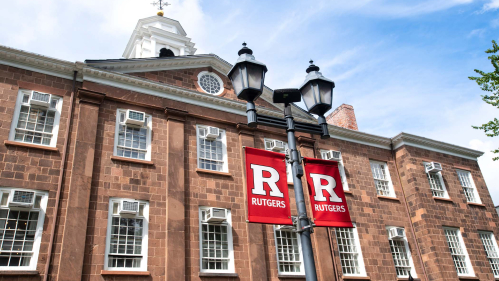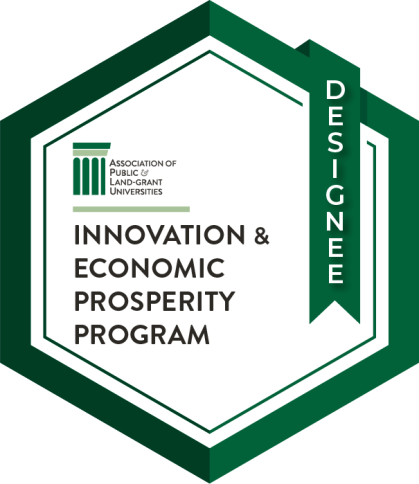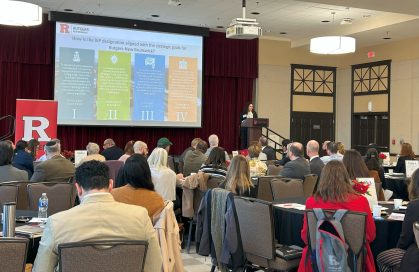Rutgers–New Brunswick Is Awarded “Innovation and Economic Prosperity” Designation

The university receives recognition for its economic development activities in the region

The Association of Public and Land-grant Universities (APLU) has designated Rutgers University–New Brunswick as an Innovation and Economic Prosperity University in recognition of its substantial and sustained commitment to economic engagement in the region.
The national designation highlights Rutgers' role as an economic catalyst through transformative innovations in academic initiatives, pioneering research and impactful community outreach programs. This includes business incubators that have launched thousands of startups, technologies addressing agricultural challenges and the university’s involvement in the New Jersey Health and Life Science Exchange (HELIX) in downtown New Brunswick, which is intended to become a leading hub for research, commercialization and education.
Rutgers–New Brunswick joins the ranks of about 80 higher education institutions throughout the nation holding this prestigious designation.
“For an institution that prides itself in leading innovative programs that benefit so many partners – communities, industries and government, to name just a few – this APLU recognition is a great point of pride,” said Rutgers–New Brunswick Chancellor Francine Conway. “It encourages us to take on ever-greater challenges that will benefit the public good.”
Valid for five years with renewal eligibility, the designation allows Rutgers–New Brunswick to apply for additional Innovation and Economic Prosperity University awards. These awards specifically commend exceptional economic engagement initiatives, potentially securing additional resources for advancing the university's economic development endeavors.
Rutgers-New Brunswick received the honor after an independent panel assessed the university’s application, which included an internal review of economic engagement, innovation and talent development activities, as well as input by external audiences on these topics. The application process required a comprehensive self-study to identify areas of strength and develop a growth and improvement plan.
"Much of the interdisciplinary work within our community and with other stakeholders has led to impactful initiatives across the region," said Peggy Brennan-Tonetta, the director of resource and economic development at Rutgers’ New Jersey Agricultural Experiment Station.
She added the “process has been instrumental in assessing our community engagement, innovation and talent development efforts, documenting these activities and planning for New Jersey's future. By engaging with internal and external audiences, we continue to assess strengths and areas for improvement in measuring and communicating our economic impact, aiming to maximize our influence on the regional economy and society."
The self-study included targeted surveys, focus groups and individual interviews focused on economic engagement, innovation and talent development revealing crucial insights into strengths at the university, including:
- The Center for Advanced Infrastructure and Transportation (CAIT), selected as a “Beyond Traffic Innovation Center” by the U.S. Department of Transportation, tackles infrastructure challenges through research on earthquake-resistant bridges, structural health monitoring and pipeline risk assessment. CAIT also trains more than 11,000 transportation professionals annually.
- The Food Innovation Center's support for more than 3,500 food and agricultural startups, including Food and Drug Administration- and U.S. Department of Agriculture-certified expertise and facilities and the commercialization of 500-plus products, including the national launch of the Impossible Burger.
- The Douglass Developmental Disabilities Center at the Graduate School of Applied and Professional Psychology trains special education professionals for working with individuals with autism. In 2023, the center partnered with school districts in underserved communities, training 77 health professionals and 300 community participants as well as serving 30 school districts.
- The Innovation, Design, and Entrepreneurship Academy program engages undergraduates in research, entrepreneurial thinking and interdisciplinary projects. The innovation studio fosters problem-solving and community engagement, leading to startups such as SageTech and BabySafe Health.
- The New Jersey Small Business Development Centers at Rutgers Business Schools’ statewide impact, facilitating more than $1.95 billion in 2023 sales revenue and supporting thousands of jobs through comprehensive business advisory services, counseling, training and business launch support.
- Rutgers Cooperative Extension's leadership in New Jersey's largest community engagement program, training more than 1,202 volunteers in environmental stewardship and civic engagement, with initiatives such as the Rutgers Environmental Stewards educating 3,835 individuals and enhancing 480 acres of wildlife habitat throughout the state.
Other achievements include groundbreaking technologies such as energy-efficient materials developed at the School of Engineering and research in climate-resistant crops at the School of Environmental and Biological Sciences. Rutgers–New Brunswick also is a leader in breeding cold-season turfgrass and disease-resistant hazelnuts, driving a new agricultural sector in the eastern United States.
The designation aligns with academic initiatives launched by Conway to enhance economic engagement. One such effort is the Chancellor Challenge, which invites the Rutgers community to propose innovative ideas that foster exploration, collaboration, concept-testing and risk-taking, all in support of the university's Academic Master Plan.
Another initiative is the Life Sciences Alliance task force, which is developing a strategic framework for science, technology, engineering and mathematics research, particularly focusing on the life sciences. This approach aims to promote interdisciplinary collaborations, create opportunities for joint research and external funding and strengthen relationships with government, nonprofit, community and industry partners.

“There is much work ahead, but this milestone advances our economic development and community engagement efforts,” said Jacqueline McGlynn, director of administration in the Office of the Chancellor and the project’s coleader. “This designation process has enhanced the university’s understanding of knowledge generation, the supporting innovation ecosystem and its economic impacts.”
To capitalize on opportunities for growth and to enhance Rutgers' economic engagement efforts, the group is developing an accessible website for both internal and external audiences. This website will host an interactive innovation and economic prosperity database, highlighting hundreds of activities, programs and initiatives identified through the self-study process. It also will include a form for submitting additional activities, programs and initiatives.
The endeavor to attain this designation began in 2022 and was led by Brennan-Tonetta, McGlynn and Amy Mandelbaum and involved faculty, staff, students, administrators and external audiences in capturing campus-wide efforts.
The designation applications are reviewed by a panel which includes representatives from other universities and regional and national partners convened by the APLU’s Commission on Economic and Community Engagement. Evaluation criteria focus on the universities' economic engagement enterprise and how well their work incorporates talent, innovation, place, and economic prosperity into planning efforts, strategic communications and encouragement of economic engagement among peers.
“Economic development is a major pillar of universities’ work,” said Mark Becker, president of the APLU. “From talent development to groundbreaking research to entrepreneurship and beyond, institutions have a central role to play in economic development. We’re pleased to recognize Rutgers University-New Brunswick for its commitment to engaging its community around these issues to advance regional economic development.”


